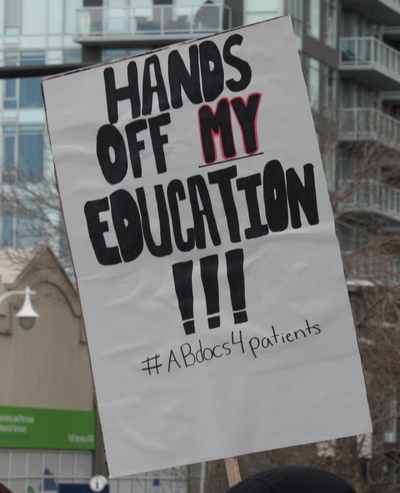|
March 5, 2020
Alberta Working Class Affirms the
Rights of All
March for What Matters a Great Success

Edmonton, February 27
Quebec Government Imposes Anti-Social
Restructuring in Education
• Increased
Concentration of Powers in the Hands of the
Minister
- Geneviève Royer
• Government Seeks to
Eliminate Teachers' Role in Decision-Making
• Constitutional
Argument to Oppose Bill 40
• Teachers Oppose Bill
40 En Masse
Lockout at
FCL Refinery in Regina
• FCL Workers Continue
Their Determined Struggle for a New Contract
Without Concessions
Alberta Working Class Affirms
the Rights of All

Edmonton, February 27
As the United Conservative Party government of
Jason Kenney brought down its anti-social and
anti-worker budget on February 27, thousands of
people converged on the legislature. March
for What Matters was conceived by a group of
Edmonton teachers who issued the call for people
to "March for What Matters." And march they did.
Teachers in their thousands, education workers,
parents, health care workers, doctors, youth and
students, seniors, artists, Indigenous people,
and working people from every sector came to
speak out on what matters to them and to
society.
The march began at the Edmonton Convention
Centre where the Greater Edmonton Teachers'
Convention was taking place and proceeded down
Jasper Avenue and then to the legislature. More
and more people joined as they finished work or
school, with at least 10,000 people assembling
at the legislature to hear speaker after speaker
express the resolve of their collectives to
oppose the Kenney government's stepped up
anti-social offensive, to call for increased
funding for social programs, and to oppose
attacks on the right to speak and organize such
as Bill 1.
   
   
Edmonton, February 27
March For What Matters actions were also held
in Calgary and across the province on February
29, showing the same energy, determination and
spirit. In Calgary, the first rallying point was
Western Canada High School, where educators and
public sector workers spoke about the right to
public education, children's right to a future,
and against the mass layoffs just announced for
the Southern Alberta Institute of Technology.
"We need teachers, we need books, we need the
money that Kenney took," they chanted. The next
rallying point was the Sheldon Chumir Urgent
Care Centre where health care union leaders
spoke about the impact of the anti-social
offensive on those in care and their families,
and called for adequate funding for health care.
As more people joined, the march grew to more
than 2,000 people as it proceeded to City Hall,
where a sea of signs expressed what matters and
the claims that people are laying. Rallies also
took place on March 29 in Banff, Fort MacMurray,
Grande Prairie, Lethbridge, Red Deer, and Slave
Lake.
Claims from whatever quarter that paying the
rich will "stimulate the economy" and bring
prosperity are in tatters. The UCP's
determination to restructure Alberta so no
vestige of a public authority is left is meeting
a wall of resistance. March for What Matters
actions expressed the growing resistance and
deep commitment of the people of Alberta to
oppose Kenney's wrecking, and to speak in their
own name about what matters, including increased
funding for education, health and social
programs. Congratulations to the organizers and
all who participated!

 

      
Calgary, February 29

Red Deer, February 29

Grande Prairie, February 29

Fort McMurray, February 29

Slave Lake, February 29

Quebec Government Imposes
Anti-Social Restructuring in Education
- Geneviève Royer -

Protest at the National Assembly November 4,
2019. Bill 40 was tabled on October 1, 2019 and
passed under closure on February 7, 2020 (FAE)
The Legault government invoked closure on
February 7, to adopt Bill 40 named An Act to
amend mainly the Education Act with regard to
school organization and governance. This
is the fourth piece of legislation that the CAQ
government has adopted through this procedure.
The others are: the Act respecting the
laicity of the State; and, the Act
to increase Québec's socio-economic prosperity
and adequately meet labour market needs
through successful immigrant integration (both
imposed on June 15, 2019); and, the Act to
simplify the process for establishing
electricity distribution rates (December
8, 2019).
Bill 40 modifies 76 laws, 6 codes and two
charters. At the time of its introduction last
October, the bill was 90 pages long and
contained over 300 articles. The Education
Minister added 160 pages of amendments just four
days prior to its forced adoption. One amendment
immediately removed the 600 elected members of
the French-language school boards, instead of
awaiting the scheduled date of their removal
according to the bill at the end of February.
Bill 40 replaces school boards with service
centres, which will now be responsible for
assigning staff to the various education
establishments, distributing grants, approving
their budgets, organizing school transportation,
child care, and services for students in
difficulty etc. Formerly, the councils of
commissioners, the school board governing body
elected through universal suffrage was
responsible for those decisions. Their election
mandate also included informing the community of
their decisions.
The elected councils of commissioners have now
been replaced by a service centre board of
directors whose members work without pay and
must undergo compulsory training. Each
french-speaking service centre board of
directors is to be composed of 8 parents, four
community members, who meet criteria laid down
in the Act, and four school staff members.
English-language service centres boards are to
be composed of between 8 to 17 parents, 4
community representatives and 4 school staff
members. The parents and community
representatives, at least in the
English-language centres, will continue to be
elected through universal suffrage. No mention
appears in Bill 40 as to how the other service
centre boards of directors either French or
English language will be chosen. The bill says,
"[the] government may, by regulation, determine
the terms, conditions and standards for
designating the members of a French-language
school service centre's board of directors and
for designating the members of an
English-language school service centre's board
of directors."
As was the case under the former school board
system, teachers, parents or "community members"
sitting on the service centre governing board
will have no control over the financial
resources to be allocated to each of the schools
comprising the service centre. The director
general and managers will propose and elaborate
resource allocation but even they have little or
no say regarding the sums of money the Minister
will make available to the service centres.
At the end of the day, the main change other
than the disappearance of officials elected
through universal suffrage is the increased
power placed in the hands of the Minister. He or
she may "prescribe the criteria and terms
applicable to the division of a French-language
school service centre's territory into
districts, [prescribe] the criteria and
procedures applicable to the division of the
territory of a French-language school service
centre into districts, [and] prescribe that a
school service centre cease to exist or
establish a new school service centre [...] and
determine objectives or targets for the
administration."
Another last-minute amendment included just
before closure and adoption obliges Quebec
municipalities to cede land free of charge to
the Ministry for the building of new schools.
This allows unelected managers to intervene in
municipal taxation and opens possibilities for
corruption to serve private economic interests.
Bill 40 is one of the many anti-social laws of
governments that eliminate intermediate levels
of decision-making from the past to concentrate
decision-making in the hands of the government
executive. Many believe that the law will allow
large-scale privatization and corruption, as the
minister has the power to decide upon services,
how they are to be offered and the allocation of
state funds. One example has been raised of
private firms to be entrusted with the
responsibility of resource-sharing among service
centres.
Quebec teachers and their allies are calling
for an education system where they and all those
concerned with education and the direction of
society play decisive roles in affirming the
right to education for all at the highest
possible level. At present, a minority that has
seized control of the economy and the state is
dictating all decisions regarding the direction
of education and other political, economic and
social matters. The people organized in their
collectives and as individuals must find ways to
deprive the tiny minority of oligarchs of their
power to impose their will on the majority, the
economy and society.

Bill 40 expresses the determination of
successive governments to deny Quebec teachers
any role in the establishment of new
arrangements for governance in education even
though teachers are those who have the expertise
in the education of Quebec students and
first-hand knowledge of the problems that need
to be resolved.
Bill 40 directly interferes with teachers'
working conditions without their consent and
without negotiations. In particular, it imposes
continuing training for teachers and requires
that the school director ensure "all teachers
fulfill their continuing education obligation."
The bill imposes unilaterally a new condition
that teachers are expected to fulfill while
those same teachers are right in the midst of
negotiations for a new collective agreement.
 The
Autonomous Teachers' Federation (FAE), which is
very active in opposition to Bill 40, says that
all terms of employment must be negotiated. In
this regard, the FAE is considering filing a
legal challenge on the grounds that the
unilateral imposition of terms of employment is
unconstitutional. Terms of employment should be
the subject of negotiations under the Act
respecting collective bargaining in the sectors
of education, social affairs and government
agencies. The
Autonomous Teachers' Federation (FAE), which is
very active in opposition to Bill 40, says that
all terms of employment must be negotiated. In
this regard, the FAE is considering filing a
legal challenge on the grounds that the
unilateral imposition of terms of employment is
unconstitutional. Terms of employment should be
the subject of negotiations under the Act
respecting collective bargaining in the sectors
of education, social affairs and government
agencies.
Bill 40 pursues the denial of the rights of
teachers to make decisions about the performance
of their duties. The government is giving itself
the right to decide according to its own agenda
and to impose its decisions on teachers without
their consent and even if they are opposed.
Teachers also condemn the attacks on their
dignity and the integrity of their work that
Bill 40 represents. For example, one of the new
powers of the Minister of Education is to "more
easily obtain students' results on the
examinations that the Minister imposes at the
elementary and secondary levels, and communicate
with school service centre employees and parents
in the school network."
The bill intensifies the pressure that is
already being exerted on teachers. The law
allows a school director in the name of academic
success to modify students' results albeit in
"consultation" with teachers. This perverts the
evaluation of learning and the progress of
students, and infringes upon the professional
judgment of teachers and the quality of
education, which cannot be reduced to exam
results. The law also creates a
"commitment-to-student-success committee" whose
mandate is to examine the results of the
students and "to promote, among the institutions
of the school service centre, educational
practices, including evaluation practices, that
are based on research."
According to this legislation, the performance
of an individual teacher, and by extension the
academic success of the students, is to be
measured by the teacher's adoption of behaviours
and practices that are prescribed by the
government. This sidelines the collective
working conditions of the teachers, for example
class sizes, and the educator's training,
experience and outlook in both teaching and the
evaluation of students progress and what is
needed to improve education generally.
Teachers have been asking for over 15 years
that class sizes be reduced so that they can
work with and guide young people through their
learning process. The government has steadily
rejected all such demands for collective
improvements in the conditions, and claims
instead that the success of students depends on
a teacher adopting the right behaviour and
approach.
This bill denies the rich experience and
accumulated knowledge of teachers, which is
reflected in their claims such as the importance
of class size and the importance of having
trained people in the class room to assist those
with special needs and to have knowledgeable
librarians and others capable of guiding
students in their learning and research.
The bill imposes conditions that are said to
emanate from studies but teachers played no role
in that research and were not even approached
for their views, both individually and
collectively. The results of the supposed
research have nothing to with the direct
experience of teachers and in fact contradict
their experience and thought material on
education and the needs of their students.
Teachers, who are directly responsible for the
education of the youth, are demanding respect
with regard to the pedagogical approach society
and the government adopt towards the youth and
the direction of education generally.

The Quebec English School Boards Association
is launching a legal challenge to Bill 40. The
bill dictates how parents will be selected to
sit on the boards of the service centres.
According to the Association, this directive
contravenes the right of the English-speaking
community to manage and control the minority
language educational institutions. This right is
contained in Section 23 of the Canadian Charter
of Rights and Freedoms.
The Federation of Quebec School Boards
maintains that Bill 40 by eliminating universal
suffrage only for French-language school boards
contravenes Section 22 of the Quebec Charter of
Human Rights and Freedoms, which states: "Every
person legally capable and qualified has the
right to be a candidate and to vote at an
election."
The Federation also points out that since
school taxes will henceforth be collected by
service centers where no one is elected by
universal suffrage, this contravenes the
principle of "no taxation without
representation" guaranteed by Section 53 of the
Constitution
Act, 1867 and applicable in Quebec
through its Section 90.
Presidents of the school boards of
Bas-Saint-Laurent, Gaspésie and
Îles-de-la-Madeleine in a letter to the Minister
of Education dated February 7, stress that
through Bill 40: "Only the Minister can develop
policies, which constitutes the greatest
centralization in the history of the Ministry of
Education. Regions, schools, small schools: all
will lose decision-making power with this bill.
The Gaspé and Témiscouata-sur-le-Lac are far
from Quebec when the time comes to make
decisions! Imagine a policy of maintaining or
closing a school decided in Quebec! The
realities of the regions are very far from the
offices of officials of the Quebec Ministry of
Education in Quebec."

Since the introduction of Bill 40 last October
and even after the law was adopted under closure
on February 7, the nearly 100,000 teachers in
Quebec have been very active in denouncing and
challenging the law and to inform the people of
its anti-social character. Teachers are
confronting the Minister of Education wherever
he appears, calling him to account for his
anti-education activities and reaffirming their
determination not to be silent.
Parents have also organized many actions to
challenge the law and defend the people's
education. As soon as the bill was introduced,
many parents' organizations asked the Minister
to postpone it so that the entire population
could have the time needed to judge its
relevance or not.
The School Together movement uniting 4,000
parents announced on February 21, it had tabled
a report to the UN Committee on Economic, Social
and Cultural Rights arguing that the Quebec
government with Bill 40 is increasing school
segregation and violating its human rights
obligations. The UN Committee will hold its
meeting in mid-March.

Teachers demonstrate on December 9, 2019 in
front of the office of the MNA for
Soulanges, Marilyne Picard.


Teachers at the office of CAQ MNA Nadine Girault
in the Laurentians on December 11, 2019.

Teachers demonstrate on January 30, 2020 during
a CAQ caucus meeting.
 
Left to right: Press conference held by Sylvain
Mallette, President of Autonomous Teachers'
Federation on February 13, 2020. Teachers
confront Education Minister Jean-François
Roberge one by one during his visit to the Board
of Trade of Metropolitan Montreal on February
21, 2020.



 
Above photos show teachers taking a stand in
their respective schools:
Quebec, Saint-Hyacinthe, Montreal and the
Outaouais.

Lockout at FCL Refinery in
Regina

Rally January 20, 2020 in Regina in support of
Co-op Refinery workers.
Federated Co-operatives Limited workers and
supporters picketed the annual meeting of FCL in
Saskatoon on February 29 and the following day.
They denounced the company's unjust demand for
concessions, lockout of workers and use of scab
mercenaries to operate the FCL Regina refinery.
The company locked out the 730 members of
Unifor Local 594 last December 5. In a
provocative anti-worker move, the company built
a multi-million dollar camp for scab mercenaries
on the refinery grounds prior to the lockout.
Right from December 5, the company in concert
with the courts and Regina police power have
tried to make Local 549's picket line
ineffective and allow the refinery to operate
with scabs and a constant flow of trucks.
Earlier on February 26, Local 594 members
attended a picket of Co-op facilities in Yorkton
and denounced the court proceedings that day for
Unifor National President and 14 other union
members in Regina on trumped-up charges of
mischief. The fifteen union members were
recently arrested during a police attack on the
Regina picket line. At the time, workers were
lawfully pursuing their right to enforce an
effective picket line and block fuel trucks from
entering the Co-op Refinery Complex. The police
assault followed the unjust issuance of a court
injunction in December to render any picket line
ineffective and allow the refinery to operate
with scab mercenaries, and for trucks to enter
and exit at will. Brandishing the unjust
injunction, a judge has also fined Unifor twice
for breaching the anti-worker court order.
Executives of FCL want to gut the workers'
Pension Plan and eliminate the jointly funded
Savings Plan. The attack amounts to an
equivalent reduction of wages of 17.5 per cent
and a significant weakening of defined pension
benefits and savings upon retirement. The
company has shamelessly tried to bribe workers
with an increase in wages just over the cost of
living during a four year contract if the
workers agree to the concessions on the pension
and savings plans. In effect, the company wants
to increase profits on the backs of workers by
attacking their pensions. This is unacceptable
and working people across the country should
stand with Regina co-op workers in rejecting the
concessions with contempt.
Workers of Local 549 and their supporters call
on Canadians to join the nationwide boycott of
Co-op gas, groceries, and services as long as
FCL demands anti-worker concessions and
continues the unjust lockout and use of scabs.
Join with One Voice and
Say NO to Anti-Worker Concessions!
Defend the Pensions Workers Have and
Fight for Pension Security for All!
Stand Shoulder to Shoulder with Fellow
Workers Fighting Injustice
at the FCL Regina Refinery!
For further information on the co-op boycott
and other issues concerning the unjust lockout
see boycottco-op.ca/.

(To access articles
individually click on the black headline.)
PDF
PREVIOUS ISSUES
| HOME
Website: www.cpcml.ca
Email: office@cpcml.ca
|

